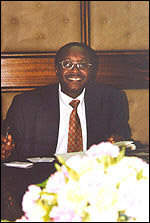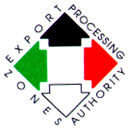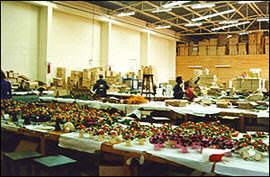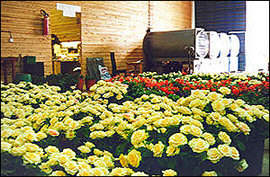
|

|

(EPZA)
Interview with:
Samuel Bundotich,
Chief Executive
Nairobi, May 6th, 1999
Contact:
British American Center Building
2nd Floor,Upper Hill, Mara Road
PO Box 50563, Nairobi, Kenya
Tel: 254 (2) 712800-6
Fax: 254 (2) 713704
|
The Export Processing Zones Authority was created in 1990 in order to attract investment. Tell us what the results have been since its inception.
Since the inception of EPZA in 1990 we are still progressing, the number of investor has continued to go up. In 1992 we had one zone, and now we have 16 zones, with about 22 investors. The volume of investment has been going up. It is now in the region of 6 billion Kenya Shillings. Exports have been going up from zero to 1.8 billion Kshs in 1997, and 2.4 billion Kshs in 1998. So it has been progressing. There is an American company that sells about 60,000 pieces of Jordache jeans to US per week. They have 1,213 people in employment.

You will also find local companies, because we have 40% internationally owned, 30% joint, between local and internationals and then 30% locally owned. The other objective which I wish to say, is that it was also meant to create employment. Currently we have 3,600 employees in the zone and another 5,000 indirectly involved in the zone, through sub-contracting. The interface between the EPZ companies and the local economy through purchasing of packaging material, papers, purchases of spare parts etc. That is what we call backward and forward linkages. The volume now is Kshs.500,000 million per annum for interaction between EPZ and the local economy. It has also assisted us diversify in our exports because we have been relying on tea, coffee and tourism, now we are going for manufactured exports. We want to diversify the exports. We have high tech companies. We have computer software and hardware, which is increasing.
What are the main commodities produced in the APZ?
We have textiles, high tech products, veterinary products (phamarceuticals), also flowers which can stay up to 15 years as they are preserved. They are exported to America, France and Europe generally.
How do you export flowers to the USA and other countries?
These are special kinds of flowers, just like the kind of that you have. These are flowers that are treated and can last upto 15 years in supple form. They remove the water and put in another substance which makes supple for almost 15 years. They can even change the colours to your taste. They even have lampshades made from them. Even the decorations of the world cup in 1996 in France were made with flowers from Kenya. The proprietor has marketed the product very well.
What are the advantages for foreign companies to establish themselves in the Export Processing Zone?
The advantages that foreign companies get under the EPZA program are:
Exemption from customs duties and value added taxes on all imports of raw material, capital equipment and other inputs
Exemption from corporate taxes from ten years from the date of the first sale as an EPZA enterprise; a lower tax of 25% for the period after the tax holiday
Exemption from payment of withholding tax on dividends and other payment made to non-resident investors for ten year and exemption from stamp duty on the on the execution of any business transactions
Access to the on-site customs clearance within the export processing zone, for both incoming and outgoing materials
One stop office services by EPZA in matters such as labor and industry relations, port clearance, issuance of permits and market information;
High zone security that reduces liability on insurance premiums, availability of ready factory buildings within zones
Accesses export markets under preferential treatment, such as COMESA, EU under Lome Convention, USA under GSP schemes and the Indian Ocean Rim
Unrestricted investment by foreigners and rapid project approval on one licence. The EPZA licence, ussued by EPZA is the sole approval required for an enterprise to operate in the EPZA
We have had challenges in our promotional endeavors. One of the things Kenya has experienced adverse publicity outside. You get a small problem, lets say a petty crime, it is blown out of proportion outside, it is as if the whole country is on fire. That tends to discourage investors. The impression is that there is political instability. The impression that is created outside in US and elsewhere by the international press is quite negative. In addition also I believe that our local press has contributed quite bit in terms of blowing things out of proportion. That discourages the investors. | The other thing is that we have started late, so many of the investors might have gone to other places, but we shall overcome this. We started in 1990, other countries started in 1960's. We are fairly late comers in the Export Processing Zones.
The condition of our infrastructure is yet another challenge; that is, the roads, the railways, our port, telecoms and power. These factors are important, because to have an exporter here we must have very efficient telecom network. We are addressing these issues as they are for instance liberalizing telecoms, and power sectors. Also to some extent we have not had big enough funds to participate worldwide in terms of promotion.
How do you feel is the response of foreign investors nowadays to Africa and Kenya in particular?

I feel that it is going to grow, because our experience of late is that inflation has gone down and the government deficit has gone down. In that process I believe it has helped investors, as there are more investors coming. We are having quite a number of them in the pipeline. Between now and August, we are going to have about 4 more foreign investors operating. We are also going to increase our promotional activities, especially with Kenya Airport Authority, Tourism Development Board, Investment Promotion Center and Export Promotion Coucil. There is that mood now where the country to promote outside.
What impact do you foresee that the COMESA summit and the COMESATEX will have for the establishment of foreign companies in the Export Processing Zones?
Our location is our major advantage. We are near the sea, and Kenya continues to attract investors particularly for now the wider East African region which will have a population of over 80 million people and the wider COMESA which has got a population over 350 million people.
In terms of EPZ, I see us expanding, but some firms that are with us may have to change because we have been treating Kenya as our territory. Now we are going to treat the wider COMESA. We export about 40% of our EPZ products to the COMESA regions. Some of the companies may have to (those who are depending on the EA region of the COMESA region as the market) may have to either turn into local companies or they will continue to pay tariffs.
The big advantage is that the region will become an investment location, both for the region and export market. Once investors come, some of course will come to the EPZ and others will remain in the domestic territory, so we expect more investors to come. A few targeted only the COMESA region. From our EPZ people have to shift emphasis either pull more for exports or to the wider world or convert into a domestic territory. The COMESA member countries want the year 2000 objectives achieved of having common external tariffs for all the countries, and therefore the EPZs now will be treated as they are outside that common tariff. We are looking at it positively. We shall becoming part of a bigger in terms of sourcing raw material from the wider COMESA. It would be advantageous in terms of e.g. Egypt for cotton or textile production, meaning firms will have to import without having to pay duty.
How do these companies within the EPZ overcome this need for raw materials?
EPZA companies overcome this problem through the incentives provided where Duty and VAT are waived raw materials. There is a ten year corporation tax holiday and 25% thereafter. There is also 10 year tax withholding tax. Then they are also free to repatriate profits and there are no foreign exchange limitations. They do not pay VAT for local products and services e.g. power, telecom.
Our Act allows us to export 80% of the products, 20% could be sold into the domestic market, provided the relevant tax are paid. Jordache is exporting 100%, the Tristar is exporting a 100%. So quite a number of them are exporting almost a 100%. If one wants to sell into the domestic market it has to be 20% of the total sales. Out of the total output 50% goes to USA, and 7% to Europe and to other parts of the world.
What is your final message to our readers?
Let us have more investors in Kenya. Kenya is a beautiful country for tourist destination. All the facilities are here. |
|
© World INvestment NEws, 1999.
This is the electronic edition of the special country report on Kenya published in Forbes Global Magazine.
November 29th 1999 Issue.
Developed by AgenciaE.Tv |
|
| | | | |
| |
|

